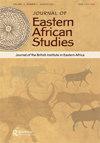非洲民主国家的独裁、选举政治和在职限制
IF 0.6
3区 社会学
Q2 AREA STUDIES
引用次数: 2
摘要
世界正在经历新一轮的独裁浪潮,其特征是全球民主的逆转。从2010年到2020年,生活在专制国家的世界人口比例从48%上升到68%。选举专制政体是当今世界上最常见的政体类型,在世界195个国家中,选举专制政体和封闭专制政体共占87个。即使在第三波民主化高潮期间,非洲的选举也很少导致权力交替。在第三次浪潮过去三十年后,本期特刊介绍了1991年至2021年这三个关键的十年里发生了多少次权力转移。在本期特刊中,我们把重点放在赞比亚,以便了解导致选举更替的一些因素,尽管埃德加·伦古总统领导的执政的爱国阵线(爱国阵线)在任职期间享有许多好处。我们表明,赞比亚2021年8月选举的结果显示了现任的局限性。我们建议,在以前经历过和平权力转移的国家,选民和反对党可能会依靠“民主肌肉记忆”来推翻独裁者,并呼吁对现任者何时以及为何失败进行更多的研究。本文章由计算机程序翻译,如有差异,请以英文原文为准。
Autocratisation, electoral politics and the limits of incumbency in African democracies
ABSTRACT The world is experiencing a new wave of autocratisation, characterised by a global democratic reversal. From 2010 to 2020, the share of the world population living in autocracies increased from 48 to 68%. Electoral autocracies are now the world's most common regime type, and along with closed autocracies they number 87 of the world's 195 states. Even during the height of the third wave of democratisation, elections in Africa rarely led to an alternation of power. Thirty years after the third wave, this special issue introduction takes stock of how many transfers of power occurred in the three crucial decades between 1991 and 2021. In this special issue, we focus on Zambia to understand some of the factors that contributed to an electoral turnover, notwithstanding the many benefits of incumbency that were enjoyed by the ruling Patriotic Front (PF) led by President Edgar Lungu. We show that the outcome of Zambia's August 2021 election demonstrates the limits of incumbency. We suggest that voters and opposition parties in countries with previous experiences of peaceful transfers of power might rely on a ‘democratic muscle-memory’, to dislodge autocrats and call for more research on when and why incumbents lose.
求助全文
通过发布文献求助,成功后即可免费获取论文全文。
去求助
来源期刊

Journal of Eastern African Studies
AREA STUDIES-
CiteScore
3.30
自引率
7.10%
发文量
12
期刊介绍:
Journal of Eastern African Studies is an international publication of the British Institute in Eastern Africa, published four times each year. It aims to promote fresh scholarly enquiry on the region from within the humanities and the social sciences, and to encourage work that communicates across disciplinary boundaries. It seeks to foster inter-disciplinary analysis, strong comparative perspectives, and research employing the most significant theoretical or methodological approaches for the region.
 求助内容:
求助内容: 应助结果提醒方式:
应助结果提醒方式:


